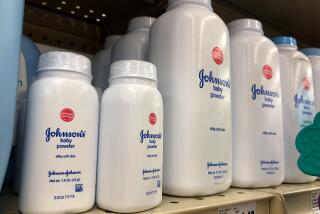Tylenol Scare Cited as J&J; Reports Loss
- Share via
NEW BRUNSWICK, N.J. — Johnson & Johnson said Thursday that the cost of the second Tylenol poisoning scare in four years, the sale of a money-losing subsidiary and other write-offs produced a $136.5-million loss for the first quarter of 1986.
Before those one-time charges, Chairman and Chief Executive James E. Burke told the audience at the company’s annual shareholders meeting here, net income for the quarter ended March 31 rose by nearly 16% to $198.5 million on sales of $1.74 billion. A year ago, the company reported net income of $171.3 million on sales of $1.59 billion for the same period.
Burke said that on the basis of the company’s fundamental earnings, its board had voted to increase the quarterly dividend on common stock to 35 cents per share from 32 1/2 cents.
The manufacturer of such familiar household products as Band-Aids, Johnson’s Baby Powder and Tylenol said the one-time charges of $335 million after taxes included $85 million for the cost of the latest Tylenol scare. That involved ceasing all sales of over-the-counter drugs in capsule form as well as the recall and free replacement of Tylenol capsules.
The capsules were the target in February of a poison tampering scheme, the second since 1982, which forced Johnson & Johnson to pull capsules off the market.
Tylenol, in all its forms, had commanded a 30% share of the U.S. over-the-counter pain reliever market.
Company President David R. Clare told shareholders that sales of Tylenol appear to have nearly recovered to pre-poisoning levels. “The consumer has returned to Tylenol much more rapidly this time (than in 1982),” he said, possibly because the company managed to issue coupons for free samples within four or five weeks of the scare--half the time that it needed in 1982.
“We believe we have at least a chance of recovering all sales,” Clare said.
Professional observers of the pharmaceutical industry say that sales of Tylenol and other non-aspirin pain relievers may also be helped this year by the federal government’s mandate that manufacturers place a notice on all packages of aspirin warning that that compound may cause the lethal Reye’s syndrome if taken by children suffering from chicken pox or flu.
Johnson & Johnson said it also wrote off $125 million in connection with its previously announced sale of its money-losing Technicare and Ultrasound divisions to General Electric.
The units made diagnostic imaging machines for the health-care industry.
“We concluded we could not achieve and maintain a profitable leadership position in that field,” Clare said.
The company took a further $125-million write-down of unspecified consumer goods investments “where the potential for success had become inadequate,” Clare said.
Burke also deflected criticism raised by a shareholder and a group of animal-rights activists who picketed the session that the company’s drug-testing procedures are cruel to laboratory animals. The company’s policy forbids animal cruelty, he said, but he added that testing potentially toxic medicines on animals is indispensable.
More to Read
Inside the business of entertainment
The Wide Shot brings you news, analysis and insights on everything from streaming wars to production — and what it all means for the future.
You may occasionally receive promotional content from the Los Angeles Times.










